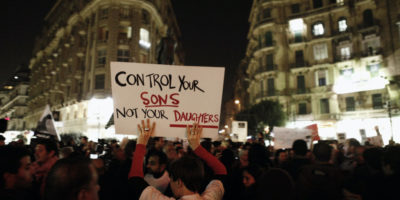In the 2020 US elections, American citizens have not only chosen their president for the next four years, but their choices are likely to affect the lives and destinies of thousands of citizens who languish in the darkness of prisons in Egypt.
As Americans were casting their ballots earlier in November, Egyptian authorities decided to release hundreds of political detainees.
The decision did not reflect a desire by the government of President Abdel Fattah el-Sisi to improve its notorious human rights record by reducing the number of political detainees or improving conditions for those who remain in jail. Rather, it seemed as a card that is being played by Cairo in the face of international pressures, especially after the regime closed all legal paths, broke the judicial system, and undermined every legislation that protected some rights of Egyptian citizens.
The Sisi regime brought in a shameful rubber stamp parliament that overthrew all the principles of rationality, balance and diplomacy in managing relationships with society and the public, in exchange for giving absolute power and authority to the military junta.
There is no doubt that any possibility of putting pressure on the Sisi regime in terms of his respect for human rights has faded. The regime has succeeded in using issues such as investment, refugees, terrorism, and the Libyan conflict to thwart all foreign attempts to ameliorate the human rights conditions. In light of the absence of such pressures by the European Union and the White House, the Sisi regime has been given a green light to carry on repression.
Yet, it is difficult to overlook what happened on 3 November, when the Cairo Criminal Court issued a historic release order for nearly 600 Egyptian detainees in more than 10 cases. Some of them had been held in pretrial detention for more than a year, without an appeal by the Public Prosecution – as usual – to the court ruling.
The Egyptian regime has used political detainees as a bargaining chip in dealing with its international counterparts, whether by offering sacrifices to the regimes that support it, or as symbolic gifts to facilitate matters and unresolved issues. This was exemplified by what Sisi did as soon as Donald Trump became president, when a number of Egyptian-American political detainees were released in the context of the interest associated with their release.
We are also accustomed to the use of the human rights file by the regime as a pressure card and a protection when faced with a storm of anger, as it did with the detainees in September, by freeing some of them and keeping others “for a time of need” – as Egyptians say.
This treatment of detainees as hostages to bargain with influential international powers and suppress dissenting voices at home did not develop overnight. It came after a costly phase of concessions by the regime to control bargaining.
At the beginning of his rule, Sisi used money and economic partnerships with Western countries, especially European countries, in order to stop any effective work seeking to change the human rights situation and end the suppression of opponents. After the end of foreign support and Egypt’s economic deterioration, the regime started to deal with the issue of political detainees as if they were hostages.
Hence, it is ludicrous to say that there is a legal situation governing the conditions of detainees in Egypt, as all citizens are detained by virtue of an order from Sisi, whether directly or indirectly via a court ruling. Some of them – individuals, families and groups – are released by direct order from him too. He alone has control over the numbers of detainees, those who died and those who suffer illness in jail since his military coup in July 2013.
This attitude was crystal clear in the regime’s reprisal against the family of Egyptian-American human rights advocate Mohamed Soltan. As soon as Soltan made a legal attempt to hold the former prime minister Hazem Al-Beblawy into account for issuing the decision to arrest, detain and torture him, the Egyptian government kidnapped Soltan’s father from inside his detention facility, and detained five other members of his family.
So what has changed in the past few days for the Sisi regime to release nearly 600 detainees, although it was the same government that, less than two months ago, arrested nearly 1,800 citizens, including more than 400 children, following the September demonstrations? And how are the cases heard, specifically the cases of political detainees, journalists, media figures, and activists arrested in connection with the September 2019 demonstrations last year?
During the past three months, prior to the US elections, the Sisi regime committed the largest number of human rights crimes unprecedented since 2014. In just three months – according to the quarterly report of the Committee for Justice (CFJ) for the period from July to September 2020, Sisi committed nearly 2,652 violations against citizens in detention facilities, including 557 cases of enforced disappearance, 1,686 cases of arbitrary deprivation of freedom, and 29 deaths inside the detention facilities, as well as 360 violations related to poor detention conditions.
While the number of victims of arbitrary deprivation of liberty has specifically increased – compared to the victims of the same pattern in previous reports – September alone witnessed the occurrence of the vast majority of violations both monitored and documented, by 65 percent and 60 percent respectively.
What has changed for the Sisi regime to suddenly release Soltan’s family, at this specific time, coinciding with the American presidential elections?
Of course, there is no definitive answer, except that a change is underway, that the regime is anticipating it, that President-Elect Biden specifically referred to this issue in the context of a statement on Egyptian-American relations, and that this expected change will not be overlooked as before using the tools of economic partnerships and bringing in foreign companies. Rather, the regime possibly thought it needed to preempt this change by offering “sacrifices” from political detainees who were kept in its possession as hostages in preparation for this moment. This is a perfect manifestation of the security mindset of the existing regime.
With Biden winning, the international arena – especially with regard to the Middle East and the situation in Egypt – will transform into a much better arena for advocacy, networking, cooperation, and influence. This in turn is expected to significantly affect the human rights climate.
With regard to forecasting the Egyptian regime’s behaviour regarding this transformation, there are three possible scenarios.
The first, is to move forward on the path of repression, and even increase its scope to create avenues of pressure on Western governments, especially the new US administration. This will mean adding more spaces for the international community to pressure Egypt, and further lowering their ceiling of expectations for amending its path.
Although this appears to be a logical path for a sadistic regime that finds pleasure in torturing its citizens, continuing it may lead to obstacles that the international community and the forces influencing it will know well. This is especially true due to the international community’s recent experiences with the wave of Arab Spring demonstrations that erupted a decade ago, leading to the end of many “friendly” and “allied” regimes. Hence, it will be difficult for the Egyptian regime to sustain this path, while it is primarily dependent on the support of Western powers and their allies in its immediate region.
The second scenario is for the regime to continue to use human rights as a negotiating card vis-a-vis the pressures that will face it.
This involves using the issue of detainees – especially human rights defenders, political detainees, and dissidents who the international community is calling for their release, activating their files with the purpose of obtaining more support, specifically financial, in light of the difficult economic conditions that the country is going through.
This approach will ensure that human rights remains a palliative tool during crises. Such a tool will be accepted by Egyptian ruling circles and Western regimes, but will definitely be rejected by the human rights community that will push back and receive more support for its work. This situation will continue until there are changes in economic conditions that entail a change on the ground, and this is the most likely scenario which I expect will emerge in the coming period.
The third and least likely scenario is the path of rationality. This would mean taking proactive steps that would reduce tension, such as opening spaces for understanding regarding the human rights file. This may be followed by the emergence of a golden and available opportunity and a new window of hope for the conditions of political detainees in Egypt. The matter may even extend to creating real opportunities for the gradual opening of civil society in Egypt, which I do not expect from this regime.




